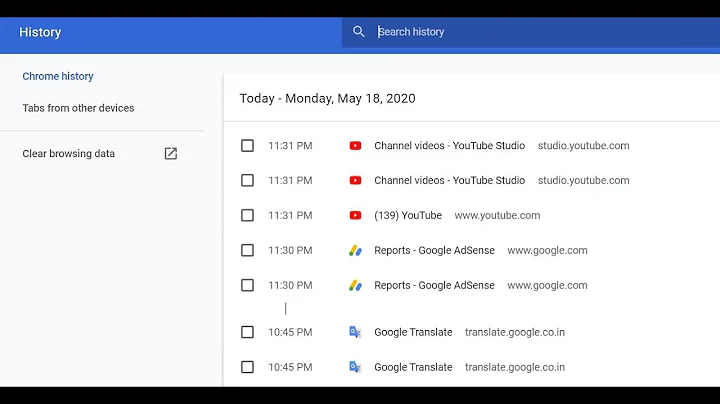Export history from chome browser
Solution 1
Close Chrome, then enter the following in your command line (the exact paths will vary, the following are for Mac OS X):
/usr/bin/sqlite3 ~/Library/Application\ Support/Google/Chrome/Default/History > history.log <<EOF
select * from urls;
EOF
The history will then be in a file called history.log in your home directory (or any directory you switched to in Terminal)
Or for a user-friendly alternative, I recommend the History Trends Unlimited extension mentioned in the answer below.
Solution 2
Also take a look at the History Trends Unlimited extension (full disclosure: I'm the developer). It does some of the analysis for you, but also has the option to export your history so you can do your own.
Solution 3
I just created a Chrome extension that exports your Chrome history in csv and json called Export History, and it works on mac (and linux and windows).
Related videos on Youtube
Joe
I’m Joe. I have interests that include Disability, Creative Writing, Open data and Computer Science. I’m contactable at [email protected]. My github profile is at: https://github.com/joereddington
Updated on September 18, 2022Comments
-
 Joe almost 2 years
Joe almost 2 yearsI'd like to be able to export the history from chrome so I can keep track of things like, for example, how many wikipedia articles I've looked at in the last week - all I'm really looking for is a url and a timestamp (I'm on a mac, if it turns out you can do this from the command line)
Where would I start? Would be great if it was the sort of thing that I could run as a cronjob...
-
iglvzx over 12 yearsI believe Chrome stores its history in an SQLite3 database. You could look for tools which can view such a file.
-
kenorb over 6 yearsPossible duplicate of Can Chrome browser history be exported to an HTML file?
-
-
Doug Harris almost 12 yearsOr copy the History db file to elsewhere in the filesystem and do the sqlite analysis w/o having to quit Chrome.
-
Sibe Jan over 7 yearsinteresting, but when downloading the history, i'll get an alphabetical list of sites... or is something likte this "U1483029737222.5261" a time-stamp?
-
Sibe Jan over 7 yearsdeleting the forward slash after 'Application' in the code provided at least a working filepath in the finder, i guess the / is a typo?
-
randy over 7 yearsYes, that is a timestamp (the numbers after the "U" are milliseconds since the Unix epoch). At the bottom of the Trends page is an "Export Raw Data" button; that will generate a file with a human-readable timestamp.
-
Sibe Jan over 7 yearsGreat, @randy! You fixed my problem. Thanks!
-
 xypha over 7 yearsplease improve your answer by including the information in the comments.
xypha over 7 yearsplease improve your answer by including the information in the comments. -
 dengApro about 6 yearsAwesome, Any Github Url?
dengApro about 6 yearsAwesome, Any Github Url? -
cgenco about 6 years
-
tog22 over 3 years@SibeJan, nope, in Terminal you have to put \s before space in filenames :)




